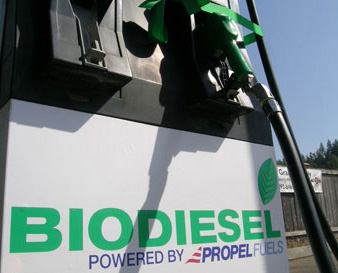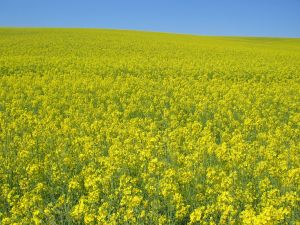Can't see the menu?
Try the text links at the bottom.
Energy Resources:
Other Biofuels
Biofuels:
Energy for vehicles from organic materials

By "biofuels" on this page, I mean fuels for vehicles, such as "biodiesel" and "bioethanol" - although you can also use the term "biofuel" to cover any kind of fuel made from living materials or their waste.
Biogas is another biofuel which can be used to power vehicles, and is covered on another page.
 |
|
Biofuels are made from two main sources:
For powering vehicles, the product is usually bioethanol or biodiesel. Bioethanol is mixed with petrol, whilst biodiesel can be used on its own. Biofuels are potentially carbon-neutral, because although carbon dioxide is released when we burn them, carbon dioxide is taken in by the plants as they grow. However, energy is needed to grow the crops, harvest them, and to process the results into usable products - and most of this energy will be from fossil fuels for farm machinery and power stations.
|
Crops such as rapeseed contain oils that can be processed into biodiesel. Crops such as sugar cane contain sugars that can be fermented into bioethanol. Producing biofuels from crops means using large amounts of land to grow those crops - that means less land for food production. We must be careful to strike a balance between crops ofr fuel and crops for food.
|
Video Clip: Weekend project - making biodiesel |
Algae - that's pond scum - are microscopic water plants. They reproduce and photosynthesise fast, and the algae are then filtered out of the water and the lipids (oils) are used to make biodiesel. They can grow in transparent plastic tubes, arranged vertically so we can maximise the area available for photosynthesis without taking up too much land. The example in the video clip is in the New Mexico desert, on land that is no use for farming anyway. |
Video Clip: Algae-derived biofuel |
|
It is claimed that biofuels will help us to reduce our reliance on fossil-fuel oil, and that this is a good thing. On the other hand, it is also claimed that it takes a huge amount of land to grow enough crops to make the amount of biofuels we'd need, so much so that it makes a big dent in the amount of land available for growing food. Who is right? Should we be using more biofuels and less fossil fuels? Think about the carbon dioxide - there are similar CO2 emissions from biofuel-powered vehicles as from petrol-powered ones. |
Video clip: Biofuels - the answer or the problem? |
|
Don't just take my word for any of this - I'm not
an expert. Find out more for yourself! |
|
|
|
Biofuels are renewable, we can plant more of the crops or grow more of the algae. |

Home Fossil Fuels Nuclear Power Solar Power Wind Power Tidal Power Hydroelectric Power Pumped Storage Wave Power Geothermal Power
Biomass Biogas Other Biofuels See also "Stuff to do" on the home page.
This site uses images from www.freefoto.com and www.sxc.hu I am not responsible for the content of external sites linked from this page.
